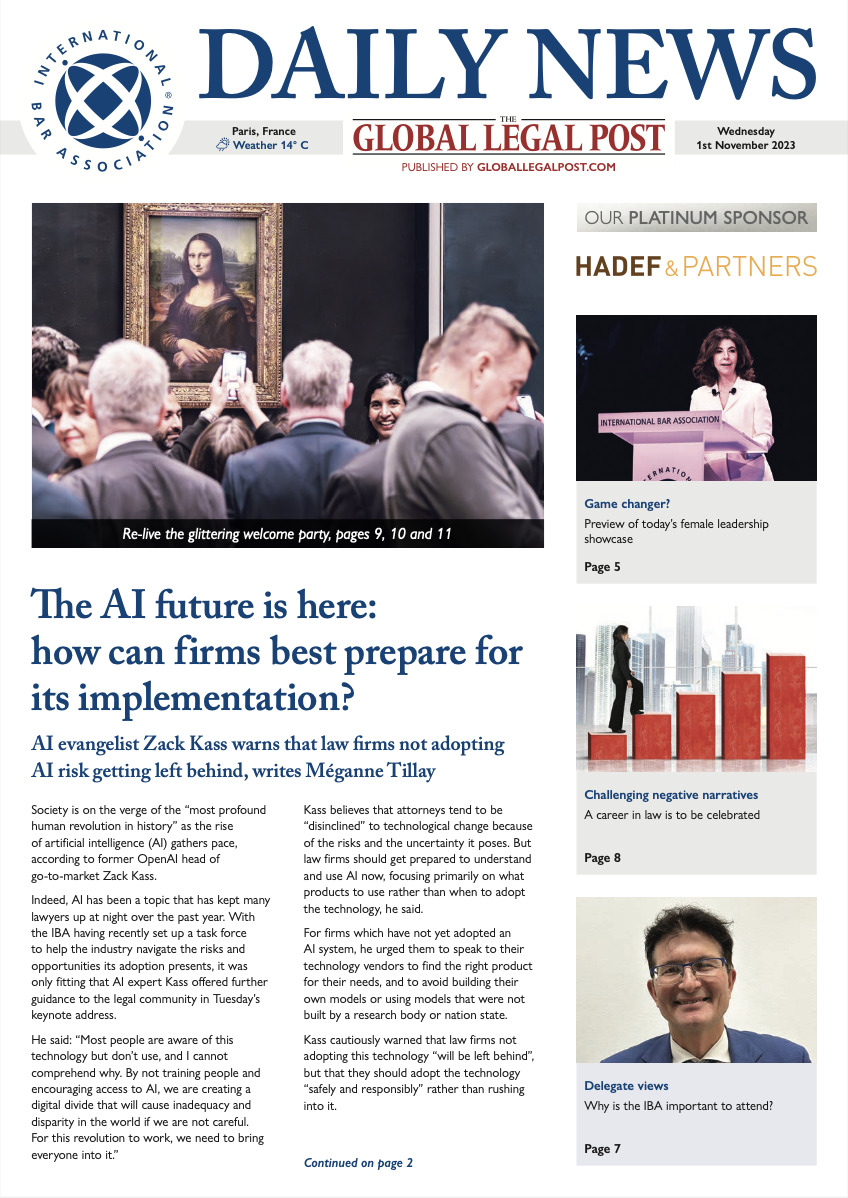About 9,000 lawyers from over 130 jurisdictions came to the International Bar Association’s Annual Meeting in Paris a few weeks ago. This marked the 75th year in which the IBA has brought together people from around the world, and for me it was the 18th time since I first attended the IBA annual meeting. The annual meeting is not only the perfect networking opportunity to establish new and strengthen existing relations between international law firms but also a great litmus test for analysing industry trends. No other legal industry event offers so many opportunities to validate thoughts and exchange ideas with peers.
As this year’s meeting was held in Paris we had the largest Sorainen delegation ever consisting of 12 Sorainen partners and 1 Crespect co-founder. Our team had over 80 meetings during the week with various international law firms, and we all noted that Legal Tech was among the most sited topics among the peers.

Here are few trends that stood out from the Parisian endeavour.
Enhanced Data Collection – A New Normal
This was the first time for me to see so many law firm partners talking about the need to collect and structure data better. Gradually we lawyers start to understand the potential in becoming more data driven. Many law firm leaders are finally grasping that we are sitting on a gold pot, which is data. And it is not just about financial data, but so much more about other type of information, which today still too often doesn’t reach our systems, like market intelligence, leads and collaboration opportunities, debriefings and lessons learned, who are the decision makers, who knows whom, who has a rare and special skill etc.
Most lawyers have just 24 hours in their day, with those few exceptions who are able to bill more :), and it is difficult to squeeze out more hours from us. Hence the management of many law firms’ are now more focused on increasing efficiency, collaboration, and productivity. That is where the enhanced data and information collection, measurement, and sharing comes to the picture.
Starting from the smallest increment of data, I feel that time capturing is becoming a market standard. Leading law firms are either already using or planning to launch TIQ Time, Intapp Time, TimeBro, Wise Time, Chrometa, to name a few time tracking software.
AI Remains the Hottest Topic
While the French enjoyed a day off on November 1st, the international legal crowd was busy discussing AI. Even Zack Kass, the former Head of Go-to-Market at OpenAI, came to educate us about the risks of falling behind if law firms neglect AI adoption.
Were we shocked? Surprised? No, our profession has long been immersed in the AI hype, and we learned that leading law firms are not only talking but also piloting AI initiatives. However, their main focus lies in figuring out how to leverage AI for the creation of contracts, memos and other legal documents for clients and the court. Usually the biggest problem they face, though, is the shortage of structured data. While creating taxonomies, checklists, workflows, and automating documents may seem mundane, they prove crucial in minimizing AI hallucinations.
Surprisingly, few lawyers we met were talking about how AI or machine learning could help to run the internal processes of a law firm better. Here, I take pride in mentioning the legal-tech company Crespect, which we spun off from Sorainen in 2022. Crespect has introduced an innovative practice management system tailored for medium and large law firms, featuring a compelling roadmap for implementing smart data analytics supported by AI and LLM (Large Language Models).

High Demand for Innovative Legal Practice Management
Contrary to the situation before, almost every law firm I have spoken to is now focusing on their practice management system. They have either recently acquired a system for the first time, or upgraded their legacy system to something more advanced, or are actively seeking the best solution available in the market. I believe it well reflects the realisation of the “golden data pot” that I mentioned earlier.
For many years, law firms focused on tools enhancing billing, invoicing and financial reporting. However, the potential of these tools to increase productivity is limited. Now, the attention is unmistakably shifting towards enhancing collaboration, managing client relationships, handling referrals, documenting lessons learned, and other data and information that I mentioned earlier for the purpose of increasing productivity through institutionalising knowledge.
Two preconditions must be met for this shift. Firstly, it should be easy for lawyers to register data and information, requiring a law firm to have an excellent practice management system. Secondly, the firm must cultivate a culture that encourages or, at the very least, have key performance indicators (KPIs) in place that provide incentives for lawyers to register relevant data and information into the system.
¡Vamos!
I look forward to September 2024, and I cannot wait to see what lessons we will learn from the IBA annual meeting in Mexico City. One thing I’m certain of; AI will continue hallucinating unless we become more disciplined in capturing and structuring data and information within our respective law firms.